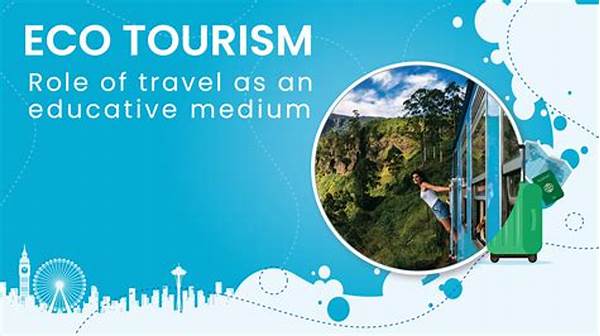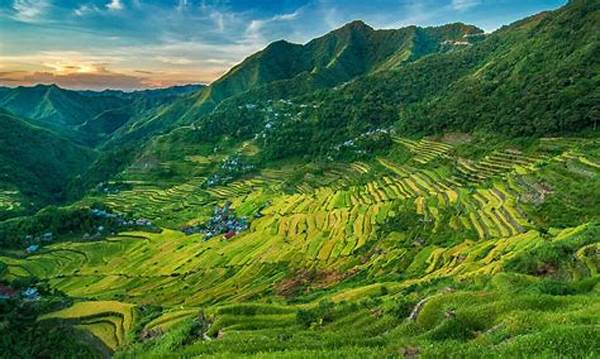In a world that’s increasingly turning its gaze towards sustainability, ecotourism stands as a shimmering beacon of hope—and no, it’s not just for tree-huggers anymore! Today, it’s all the rage, attracting adventurous millennials, curious retirees, and eco-warriors alike. Imagine diving into a blue lagoon teeming with marine life or trekking the lush rainforests without leaving a carbon footprint. It’s not just another vacation; it’s a story you live.
Read More : Why Families Recommend Natural Tourist Attractions In Bogor Eco Parks
As stunning landscapes continue to grace Instagram feeds worldwide, what once was a niche market has morphed into mainstream mania. But how do you make your travel experience unique and meaningful amidst this growing wave? Stay with us as we plunge into the captivating universe of ecotourism, where thrilling adventures meet conscientious choices.
Why Ecotourism is Trending
Ecotourism isn’t just about slapping on hiking boots and avoiding plastic straws. This burgeoning industry appeals to our growing social conscience and thirst for authenticity. According to recent statistics, the global ecotourism market is projected to grow significantly, driven by increasing public awareness and a desire to escape commercial tourism tropes. That’s right, say goodbye to overcrowded beaches and hello to pristine wilderness.
What sets ecotourism apart is its pledge to minimal impact and maximum good. Traveling has never felt more rewarding than when your getaway contributes positively to local communities and ecosystems. It’s the perfect antidote to the guilt of flying halfway across the world.
Sustainable Accommodations
Arguably the cornerstone of all eco-adventures, sustainable accommodations offer experiences as diverse as the landscapes they inhabit. From rustic cabins in national parks to luxurious eco-lodges in Costa Rica, the latest developments in ecotourism focus on creating accommodations that are as much a part of the environment as the wildlife itself.
With a wealth of options available, how does one choose the right stay? A good rule of thumb is to look for certifications from recognized eco-labels like Green Key or EarthCheck.
Impact on Local Economies
The move towards ecotourism also acts as a lifeline for local economies, offering opportunities to showcase indigenous cultures and authentic craftmanship. When tourists stroll through a Peruvian village and purchase locally-made alpaca blankets, they’re not just gathering souvenirs; they’re contributing directly to economic sustainability.
Their dollars strengthen local communities, fueling education, healthcare, and conservation efforts. It’s a cycle of support that everyone benefits from, creating a more equitable travel experience.
Eco-Activities Gaining Popularity
No longer does sustainable travel mean sacrificing adventure. The latest developments in ecotourism highlight how adrenaline-pumping experiences meet conservation. Whether it’s white-water rafting in New Zealand or ethical wildlife safaris in Africa, the usual tourism pitfalls are replaced by genuine passion and respect for nature.
These activities offer travelers a unique selling point—memorable stories to tell without unsettling the natural habitat.
Read More : How To Find Nature Tourism Terdekat From Jakarta For Weekend Escapes
Testimonies from Travelers
Who better to attest to the value of ecotourism than those who’ve wandered the trails and swum the seas? Take Sarah, a young traveler from Canada. “I went to Madagascar last summer,” she shares. “We visited reserves that prioritized conservation, and by simply being there, I felt a part of something bigger.”
These tales aren’t just great for the campfire; they’re influential marketing tools. Personal experiences drive interest and foster desire, making people realize that the latest developments in ecotourism offer more than just a trip—they provide transformative life experiences.
The Objectives of Modern Ecotourism
Latest developments in ecotourism aren’t mere trends; they represent an evolution in how we view travel and its impact on the world.
Looking Forward: Innovations in Ecotourism
The trajectory of ecotourism is set to ascend as innovation fuels more sustainable practices. From green tech in accommodations to blockchain transparency in operations, modern adaptations are set to redefine the sector. Yet, the essence remains constant—to tread gently and with purpose, leaving nothing behind but footprints and taking memories.
In summary, the latest developments in ecotourism aren’t just capturing the attention of the environmentally conscious—they’re redefining what it means to travel responsibly. Whether you’re drawn by the promise of untouched landscapes or the allure of cultural connections, ecotourism offers a rich tapestry of experiences that both educate and inspire.
Final Thoughts
The adventure awaits, so grab your gear, set your intentions, and dive into a world where every step you take helps the world flourish. With countless trails leading back to our best selves and the environment, ecotourism is more than just the latest development; it’s a lifelong journey you’ll never forget.


